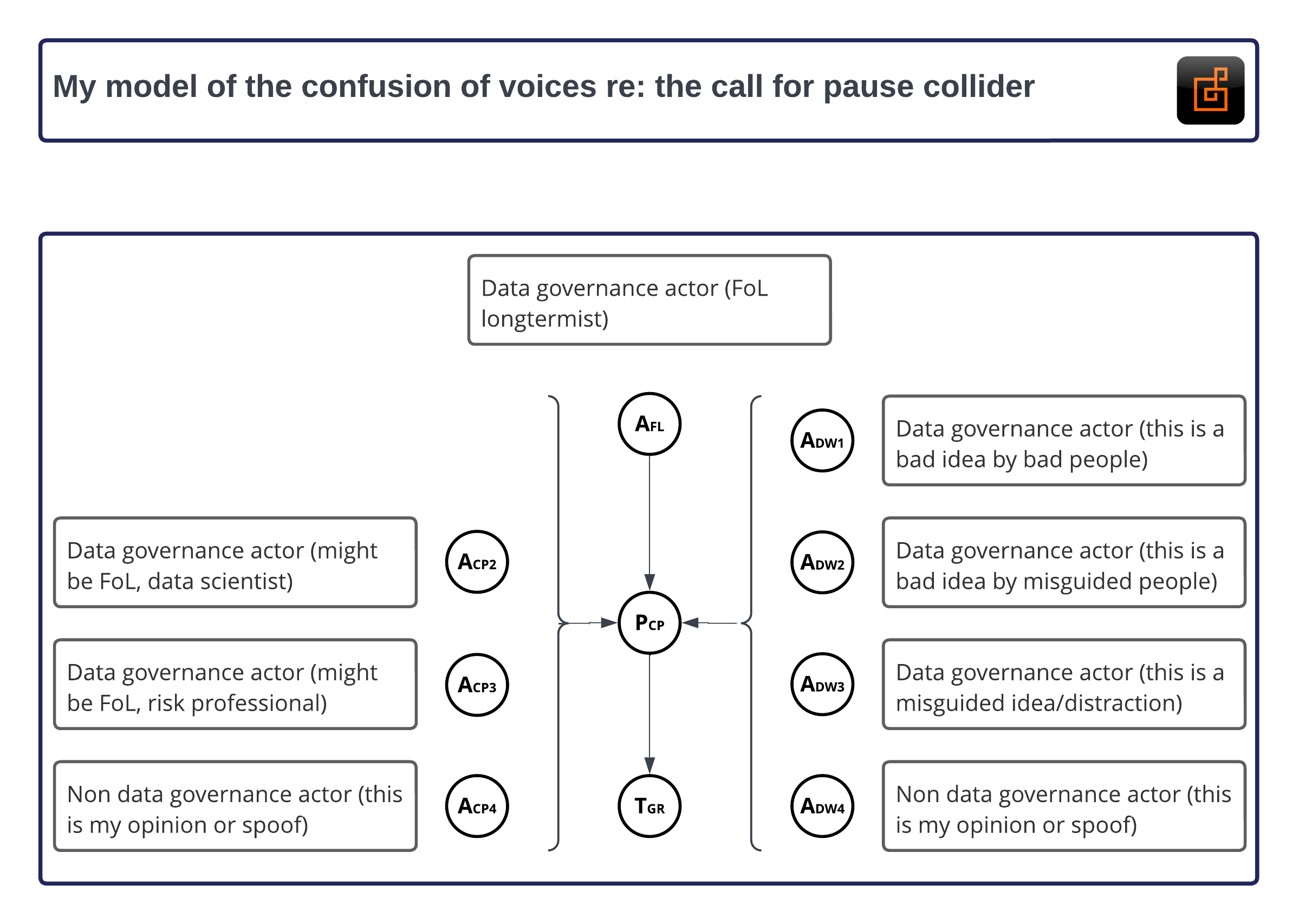I Would Have Written a Shorter Letter, But I Didn't Have the Time

My reflections on the Future for Life 'call for pause' letter controversy, which is not a false controversy
The title is from Blaise Pascal (1623-1662, a short life, Quote Investigator), whose work we continuously encounter in the body of work on mathematics, economics, probability and many other useful things. In his era, educated people believed mice spontaneously generated in piles of straw, would attest as having seen a unicorn’s horn (but not a unicorn itself) and relied on the notion that a murdered body will bleed in the presence of the murderer.
This person will have heard of Copernicus, but doesn’t take him seriously on the basis of insufficient evidence. We still have a lot of people who think in this paradigm. This person believed that nature abhors a vacuum - a belief that persists to modern times, one can hear it spoken across many contexts in any representative week. They also believe that dreams predict the future, which is almost trivially common as an observable. Old|good views mix with old|bad views; both mixing with new|good views and new|bad views. The notation goes to causal diagramming: this is a mess of conditional probabilities.
I define 'good' and 'bad' in terms of decision risk, where 'bad' equates to 'wrong'. Decision risk is the chance and cost of being wrong, where wrong is a course of action that was available to be taken and which you could have taken; you're now regretting not having taken it. This thinking posture immediately puts the user in the very useful 'prospective hindsight' analysis stance. Many good things from this strategic thinking posture.
I also define time differently to most in my thought experiments. I know it's better to randomise a set of future possibilities and better understand the past, which is the only thing of record that we actually have and the analysis of which changes over time, memory and distance. I study the paths not taken because we don't usually come to a place that says 'this path goes left and this path goes right: make a choice'. They merge, co-position and never end until you do. You only really notice them as some asymptote is reached and you realise you can see a whole lot more, but you're not sure how it happened or even when.
The Reverend Bayes' thought experiment of standing with your back to the billiard table, throwing the balls over your shoulder and thinking about how to estimate where they might now be is a master model that anyone can adopt. Contextualise it as if you were sight impaired and needed to figure out if the people shouting "FIRE" are directing your attention to a fire or are directing fire at you. Such a thing is occurring with a big spike of attentional energy on the 'call to pause' letter by the Future of Life Institute, a body of smiling people making vague statements about good things.
In 2020 I started working to find a set of tests to answer the question: how to spot the difference between an excellent AI ethicist and an excellent AI ethics washer. I dropped breadcrumbs to this work on LI whenever I had a little breakthrough. One of the basic steps is to recognise vapid word wash when you see it. This is easy because vapid word wash is very common; in fact it's become the background default and has faded from view therefore. Another is to look for depth: Blaise Pascal might also might have said there is an irreducible level of complexity, which requires patient explication.
Congruence of knowledge models keeps us all from disagreeing forever as we chase NP-hard problems thinking there's enough of us, or we're smart enough, or we're democratised enough. One trick the neurodiverse have is a balancing between explanations; not fully understanding the equilibrium of the world around them, they can move between explanatory states as they take part in the march of time. It's useful but hard won because it involves working through serious cognitive dissonance. But that's the data governance world as I see it, so a useful empirical basis therefore.
This week a bunch of my leaders, the people I follow that is, clashed over the call to pause letter. All of a sudden, I was on the right of people I was usually often on the left of and distant from the people I was usually standing next to. I signed it because doing so was part of my family history as I saw it. My grandmother protested the Springbok tour, on the front lines; she was ok because she'd also protested the Vietnam war. She was NZ's first female broadcaster (all the men were in North Africa/Italy during the Second World War) and her voice is archived in the National Archives interviewing the last Kiwi survivors of Gallipoli.
My great grandmother kept a pub with a smile, a good heart and a fierce right hook. When the 1931 Napier earthquake happened, she got my grandfather to load up the car with provisions, drive until you get there and come straight back for the next load. My second great grandmother lost no time getting enrolled to vote, one of the world's first thus. We did the obvious good thing. So seeing these leaders getting into fisticuffs over signing was weird.
My training tells me this is a good place to be: it's time to update a mental model somewhere, because there is disconfirming evidence in the clash. Though the next step is always to separate debate from diatribes. I'm in that stage now, having reached out to friends to send me more things to read. I read deeper to the left than I do to the right as it turns out: the right runs out of better ideas faster in my view. But I wanted to put this Bayesian prior into the timestream so I can learn better going forward.
I was fortunate enough to write Ministerial letters, which are a form of official communications produced to ensure democratic communications between the elected government and the constituency. In any representative week I might be thinking about how the Minister would listen to their advisors and write a letter in their own style to a person who might be anyone from someone they may never meet to the head of the national telecommunications company. Your writing has to be so nuanced.
This meant being sensitive to managerialisms, trite anodynes and word salad, as they enter the words that people use, on any representative day, in any representative office, of any representative business unit. I had worked in publishing and knew how words and phrases meme their way through time: nature abhors a vacuum right? So with modern writing, you need to get two or three layers down to see if there's a planet beneath the fog or if this is just a bloated gas giant. Apologies for the fast metaphorification.
And no surprises that few places even have a third layer. The second layer is just the office stationary cupboard, or drawer. This phenomenon is common across all groups of smiling people pronouncing good things about the world, a group which includes authoritarians, people not in the crowd at the barbecues I attend. This Future of Life crowd looks much like any other. Except they are offering a small chance at pressing a button that says please slow the heck down with industrialising this technology further into the digital ecosystem.
Going back to the title: yes, it's a short, trite letter. The world is full of them. This one says pause to reduce the likelihood of a bunch of risks eventuating. I think that's an obvious good thing.
Update
I'm a few days into using a combination of Floridi's RPT model and Pearl's causal diagramming techniques to identify valid voice, better locate the issues and assess the underlying risk. Here's my working model as at 5/4/23.

